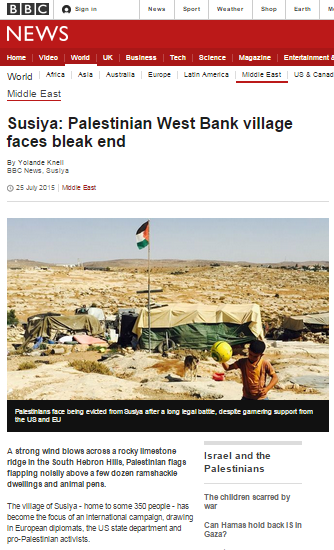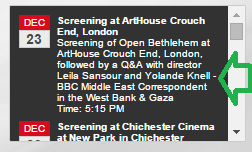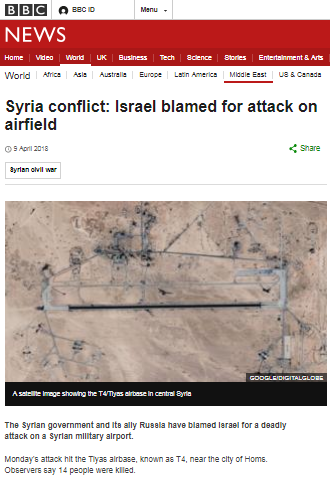In recent days the BBC Jerusalem Bureau’s Yolande Knell has produced two very similar reports on different platforms concerning illegally built structures in the South Hebron Hills.
On July 25th an article appeared in the ‘Features’ section of the BBC News website’s Middle East page under the title “Susiya: Palestinian West Bank village faces bleak end“, where it remained for three consecutive days.
The July 26th edition of the BBC World Service radio programme ‘Newshour’ – presented by Julian Marshall – included a report (from 30:10 here) on the same topic by Knell. In his introduction to that audio report, Marshall states:
“Earlier this year Israel’s High Court ruled against an injunction by residents of Susiya trying to stop Israeli demolition orders. Now, before an appeal is heard, they’ve been told to expect their homes to be destroyed any day.”
That portrayal is inaccurate and misleading.
“During the years while the legal proceedings were ongoing, the petitioners continued to expand their illegal construction, raising the number of structures to a few dozen. They exploited a cease and desist order that temporarily prevented Israel from demolishing the illegal structures.
On 4 May 2015, the Supreme Court declined to issue another temporary injunction preventing demolitions. The Court found that the petitioners chose to continue to build illegally in violation of judicial rulings that were meant to facilitate the examination of the situation in its entirety, including the actions of the Israeli authorities.
Following the Supreme Court’s decision in May, Israel has decided to remove only those structures that were constructed in defiance of judicial rulings or by the exploitation of judicial orders. Israel has undertaken not to demolish the remaining illegal structures before the Supreme Court renders its decision and then only with the Court’s permission. The Court will hear arguments from both sides of the case in August 2015.” [emphasis added]
Both Knell’s reports include considerable input from one Nasser Nawaja – described by her in the audio report as “one of about 350 villagers” and in the written report as a “Susiya resident”.
Whilst those descriptions may indeed be accurate, Mr Nawaja’s position as a community organizer and a field researcher for the political NGO B’Tselem is highly relevant to this story. But – in breach of the BBC editorial guidelines on impartiality which state “[w]e should not automatically assume that contributors from other organisations (such as academics, journalists, researchers and representatives of charities) are unbiased and we may need to make it clear to the audience when contributors are associated with a particular viewpoint, if it is not apparent from their contribution or from the context in which their contribution is made” – Knell refrains from telling audiences about her main interviewee’s day job or his worldwide promotion of a libel which has darkly medieval overtones.
“My name is Nasser Nawajah, I’m 30 years old and a resident of a Palestinian village called Susiya in the occupied West Bank. My home is here in the Hebron hills that Israel calls an “illegal outpost” and they have demolished our town five times since 1985, even poisoning our wells.” [emphasis added]
As NGO Monitor reports, B’Tselem is one of a number of foreign funded political organisations involved in promoting the Susiya campaign.
“Khirbet Susiya (Susya) is a small Arab village in the South Hebron Hills. There are widely divergent narratives regarding the village and its history; according to Israeli authorities, the village’s structures have been illegally built. A protracted court battle ensued regarding the demolition of the village.
The Israeli Supreme Court recently cleared the legal barriers to demolition, on the grounds that the structures were constructed illegally, entirely without permits or approved plans. (Under the Oslo framework, Israel is responsible for planning and construction in Area C, which is where Susya is located.)
A number of governments, including the U.S. and European governments, are lobbying the Israeli government to prevent the demolition. […]
As with many such contentious issues in the Arab-Israeli conflict, many NGOs are active in promoting the Palestinian narrative, which is then repeated by the European and U.S. officials. These NGOs are themselves heavily subsidized by European and U.S. entities.”
A proportion of B’Tselem’s funding comes from the EU and the UK government and the involvement of those two entities in this story does not end there. As the Times of Israel reported:
“Little wonder the Europeans have rushed to Susya’s aid. Practically the entire hamlet is being sustained by EU funding. The solar panels generating its electricity were donated by the German foreign ministry; the clinic and water purifying systems were donated by Italy, and the master plan which the Israeli court is to debate on August 3 was funded by the UK. Significantly, 22 of the 37 buildings scheduled for demolition are EU-funded.”
Anyone who has travelled around Area C in the past few months will not be surprised by that revelation of pirate construction of EU-funded structures in places which according to the Oslo accords are under Israeli control – including planning and zoning. The road from Jerusalem to the Dead Sea, for example, offers an excellent view of dozens of relatively recent structures bearing the EU flag.
Whilst BBC licence fee payers might perhaps have appreciated some in-depth investigative reporting on the subject of why their taxes are going towards illegal construction which flouts the terms of the Oslo Accords and creates ‘facts on the ground’ despite those agreeents clearly stating that the future of Area C is to be determined by means of final status negotiations, Yolande Knell’s reports avoided all mention of the above topics with the exception of the following opaque sentence in the written report:
“European donations help sustain Susiya village, which is not connected to mains electricity or public water supplies.”
Instead, Knell’s pathos-rich accounts clearly steer audiences towards her desired take away messaging.
“Now, for the third time in three decades, villagers are facing the threat of another forced displacement.”
“Seventy-year-old Mohammed Nawaja looks on. “Each time we’ve had to rebuild we’ve started with nothing,” he says. “I must trust in God that my grandchildren won’t have to live the same experience.”” (BBC News website report)
“Nearby local children play football. Their grandparents and parents were forced to move from their homes and now they face the same uncertainty.” (Newshour report)
In addition to failing to mention that the High Court of Justice found that the families in Susiya already have homes in the nearby village of Yatta in Area A, Knell refrains from telling her readers and listeners that the Israeli government has offered the residents an alternative.
“They have been offered plots of similar, or even better, quality in a nearby area that already conforms to planning and zoning laws. Building houses there will also improve the petitioners’ quality of life, giving them access to infrastructure and educational facilities that are not available in their current illegal locations. Additionally, they will be allowed to continue the same agricultural activities on the lands they currently claim.”
Yolande Knell’s failure to tell audiences the whole story and her concealment of the fact that her main interviewee is an employee of one of the political NGOs involved in the public relations campaign promoting the one-sided Susiya narrative is ample indication of the fact that these two reports – once again – have more to do with political activism than accurate and impartial news reporting.
Related Articles:
BBC’s Yolande Knell ditches any semblance of impartiality
Resources:
BBC News online – contact details
BBC World Service – contact details




